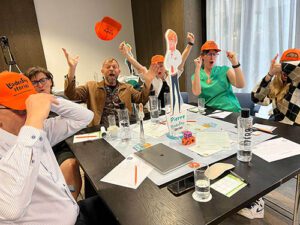In today’s competitive landscape, employee skill development isn’t just a perk—it’s a necessity. Businesses that overlook skills development run the risk of becoming obsolete as new technology emerges.
Developing employees’ skills is an effective and direct way to become a more well-rounded, efficient, and creative business. According to Pew Research, nearly 50% of employees say extra training and education helped them advance within their current company. And that’s just the tip of the iceberg; prioritizing the development of skills can improve leadership, efficiency, creativity, productivity, teamwork, and much more.
What is Skill Development?
Let’s start with the basics—what is skill development? As you can probably guess, it means the process of improving, enhancing, or gaining skills that help you complete tasks more efficiently or effectively.
It is an incredibly broad term that covers a huge range of skills and methods. It covers everything from training to be more tech savvy or better with a certain program to professional training or certifications. However, the uniting factor is the focus on improving or gaining skills that are relevant to your work. Helping employees build these skills is a way to improve your company’s efficiency and boost retention.
Why is Skill Development Important?
So, why exactly is work skill development important? There are a multitude of reasons, so let’s dive in and look at them from the perspective of employees and employers. As for employees, developing skills can help them in numerous ways. Most obviously, it can help them in their day-to-day work. With improved skills, they can complete their tasks more effectively and efficiently.
Employee development can also help employees with their futures. Having improved skill sets can help employees grow as professionals, which in turn can help them get promotions or other new job opportunities. That also helps businesses as well. Developing employees’ skills can help companies find better candidates for jobs and promotions from within, saving time and money while also getting great candidates.
And of course, developing skills means better employees—ultimately helping a business’s bottom line through better and more efficient work. Businesses want their employees to be as effective as possible, and prioritizing the development of skills helps accomplish that. It can also serve as a good employee incentive for both current and potential employees. The option of employee development can motivate current employees and help attract potential candidates.
Benefits of Employee Skills Development
The benefits of helping employees improve their skills are nearly endless, and these are just a few of the most important ones.
Upskilling
Upskilling, the process of teaching employees new skills or enhancing their existing ones to keep up with changing industry demands, helps employees gain new and improved skills. These skills directly translate into the workplace, and they can help employees be more effective in their positions.
Upskilled employees are more well-rounded and capable of handling new technologies, methodologies, or market shifts. This also creates more potential for a business owner. Employees can fulfill different roles, are more open to promotions, and can utilize these new skills to create even stronger teams.
Leadership Growth
There are few things more important in a business than leadership. Good leaders can be the difference between a healthy and productive workplace and a toxic and inefficient one. Skill development is a great way to improve leadership skills and encourage leadership growth. Employees can become better leaders through improving their skills and having a better understanding of the skills required to fill various management roles in an organization.
They can also improve leadership more directly through employee development programs that target leadership. Leadership Stories and Team Leadership DNA for example are programs focused on leadership-specific skills.
Increased Productivity
How fast employees can complete tasks and how much work they’re able to complete in a given period of time are incredibly important when it comes to business. High productivity can help drive a business towards success.
Developing skills is an effective way to increase productivity. By furthering skills, employees can gain new knowledge and learn techniques that help them accomplish more tasks in less time.
Skill Development Examples
Though developing skills seems fairly straightforward, it can be hard to conceptualize without looking at how it’s implemented in the real world. There are also countless different ways to go about developing skills.
For a better understanding of development of skill, it’s important to look at some examples. Here are some skill development examples that showcase what it can look like and forms it can take when implemented in the workplace.
Conferences
Conferences are a classic way to improve and gain skills. These events are an opportunity to gain new perspectives, network, learn new things, and acquire new skills—all while enjoying the atmosphere of a conference.
Attendees of conferences often learn about new trends, set new goals, and gain valuable insider knowledge. These can all help employees further expand and improve upon their skill sets. Conferences can also vary greatly in their goals. There are conferences more focused on networking and others more focused on workshops and seminars. Each of those has its own pros and cons, but they are also useful tools for developing skills.
Professional Development Events
Professional development events are another option for developing employees’ skills. These events use training and learning to help participants improve themselves and their abilities, making them better employees overall.
As with conferences, these come in all different shapes and sizes. There are online professional development workshops, in-person events like StrengthsFinder, and more. This variety gives employees/businesses the ability to focus on specific skills.
Another benefit of these events is that they serve as great team building and bonding opportunities. Shared learning experiences can further bonds and strengthen relationships, both of which help employees and teams be more effective in the long run.
Online or Professional Courses
For more direct and targeted development of skills, online or professional courses are a great choice. While they may sound similar to professional development events, these courses are more focused on specific hard skills like coding or sales.
Professional courses typically target a specific skill, often a specialized technical skill. These courses are perfect for expanding skillsets or learning new techniques within a skillset. This also tends to make them a more individually minded development option.
That said, these can also be an effective opportunity for team bonding. By going through these courses together, employees can build and deepen bonds with their coworkers while they become more skilled.
Mentorship
A simple and straightforward option for skills development is utilizing mentorships. Mentorships have been around forever and for good reason; they are an incredibly effective tool to help employees gain new knowledge and skills while forming bonds with other employees.
Having employees mentor new or less skilled employees—or even employees from different departments entirely—provides those employees with an opportunity to learn more from their coworkers and develop their skills. It can also promote more awareness about different departments, roles, and tasks within a business. This understanding can help create more well-rounded teams that can solve a variety of problems.
Internal Mobility Programs
One last option for developing skills are internal mobility programs. These programs aim to help employees move around within an organization, whether that’s promotions or temporary sideways movements.
Internal mobility can greatly improve employees’ skills. For example, temporarily moving to another department can help them acquire new skills outside of those typically needed for work. Promotions can also be a way for employees to develop their skills such as leadership.
Prioritize Skill Building with TeamBonding
Skill development is essential for businesses that want to stay competitive and achieve their goals. Developing employees’ skills results in a more skilled, effective, efficient, and well-rounded workforce that can drive a business forward.
Planning development events can be a time-consuming process, especially for busy business owners and leaders. Thankfully, you can partner with TeamBonding to help you plan your events, that way you can focus on the things that really matter.
So take a look at our events and get in touch with us today to start prioritizing skill building in your workplace.
















